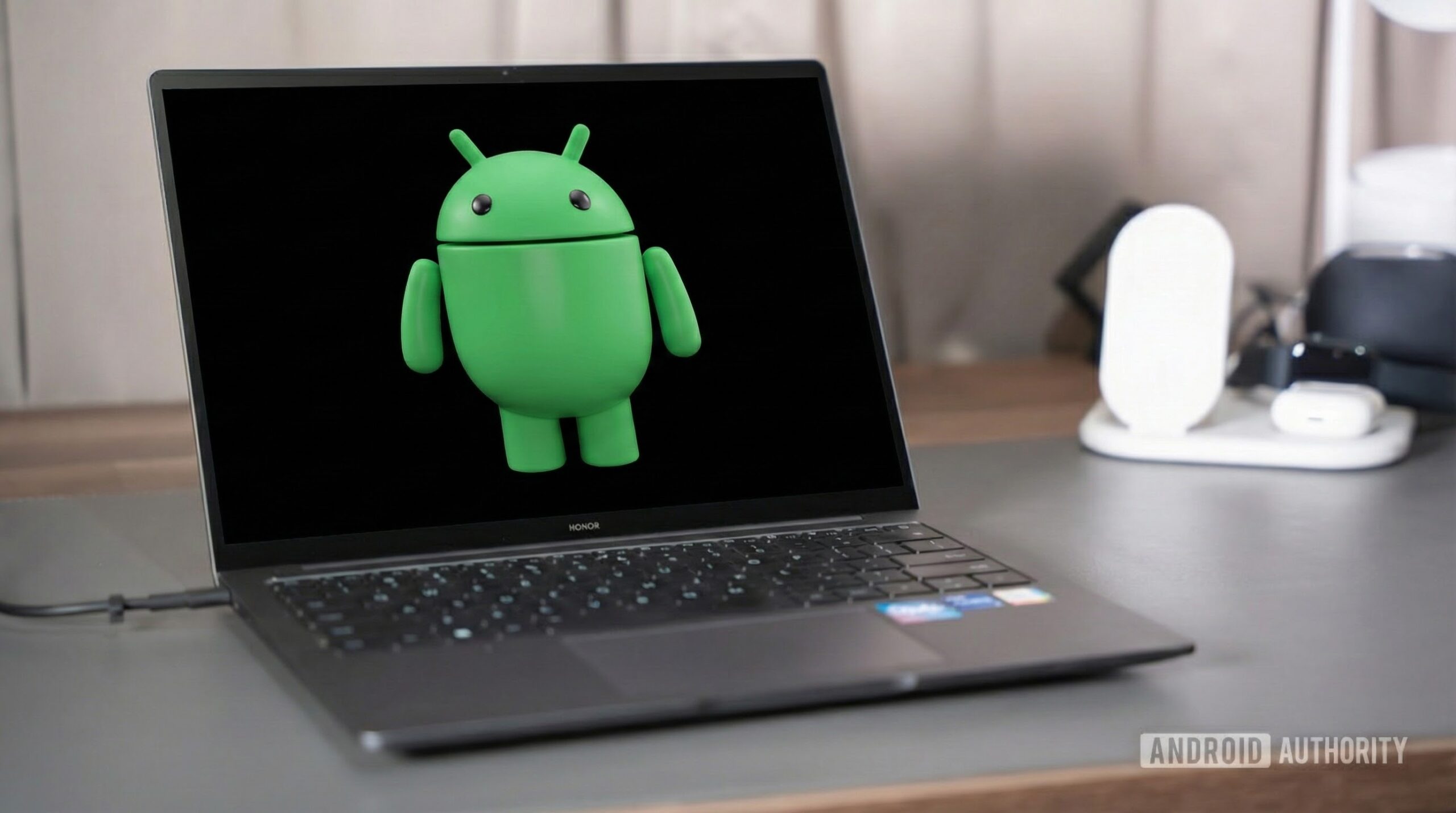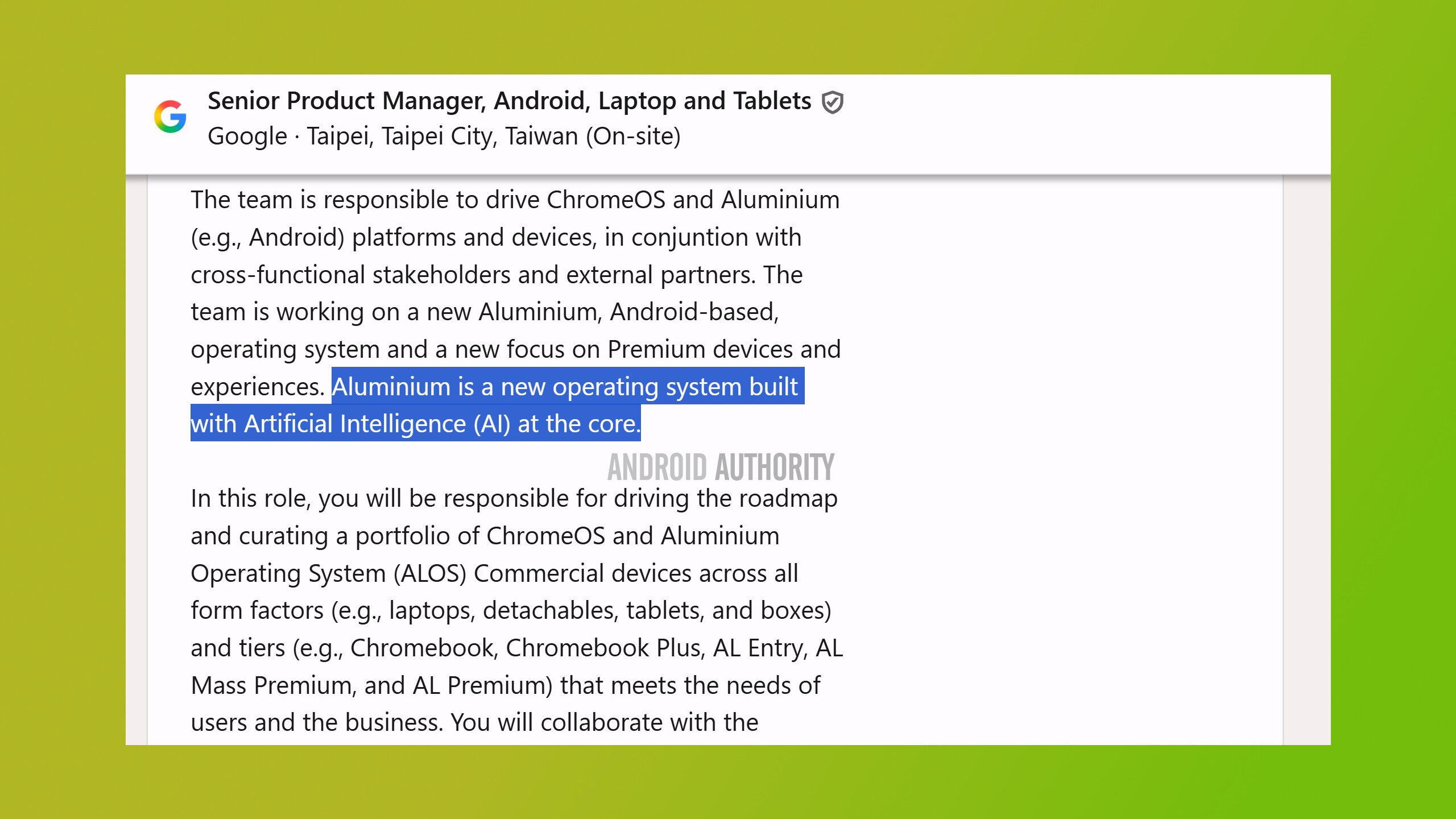
The Android operating system is incredibly versatile. Beyond smartphones, it officially powers tablets, watches, TVs, cars, and XR headsets. However, it has virtually no presence on traditional PCs, where Google instead relies on ChromeOS. Despite Google’s efforts to challenge the dominance of Windows and macOS, ChromeOS remains a distant third. To close this gap, the company is unifying ChromeOS and Android into a single desktop platform, codenamed ‘Aluminium OS.’ Here’s what we know so far.
Android on PCs: The story so far
One year ago, Android Authority exclusively revealed Google’s plan to rally behind Android as its unified desktop OS. Our source indicated that this shift aims to create products that better compete with the iPad while making more effective use of development resources. In July, a Google executive confirmed part of our reporting, revealing that the company intends to merge ChromeOS and Android into a single platform. Finally, at Qualcomm’s Snapdragon Summit in September, Google officially announced it is bringing Android to the PC market. The company stated it is collaborating with Qualcomm to build a new platform that converges mobile and desktop computing, leveraging recent advancements in AI.
Qualcomm CEO Cristiano Amon (left) and Google SVP of Devices and Services Rick Osterloh (right) announcing a joint project to bring Android to PCs.
While we now know Google is building Android for PCs, there are still many unknown details. Is Google retiring the ChromeOS brand? Will existing Chromebooks receive the new operating system, or will they be left behind? Will this OS arrive only on budget machines, or target premium PCs as well? What will the interface actually look like, and what new features can we expect?
These are the burning questions as Google continues developing the platform. We likely won’t have all the answers until we get closer to launch, but thanks to job listings and bug reports, we’ve uncovered early details that offer some clues.
Don’t want to miss the best from Android Authority?
Aluminium OS: Google’s PC ambitions take shape
Over the weekend, a tipster on Telegram named Frost Core shared a link to an intriguing Google job listing for a ‘Senior Product Manager, Android, Laptop and Tablets.’ While we already know Google is bringing Android to the PC, the listing explicitly states that the role involves ‘working on a new Aluminium, Android-based, operating system.’ This effectively confirms that Aluminium is the codename for the new unified platform. The name appears to be a nod to the project’s roots: like Chromium (the open-source version of ChromeOS), Aluminium is a metal ending in ‘-ium.’ The choice of the British spelling — emphasizing the ‘Al’ prefix — likely pays homage to Android serving as the project’s foundation.”
Much like Android XR, Google says its new Aluminium OS is ‘built with artificial intelligence (AI) at the core.’ This implies deep integration with Gemini, Google’s AI chatbot and large language model (LLM). At the Snapdragon Summit, Rick Osterloh, Google’s SVP of Devices and Services, outlined the company’s plans to bring its AI stack to PCs:
“This is another way we can leverage all of the great work we’re doing together on our AI stack, our full stack, bringing Gemini models, bringing the assistant, bringing all of our applications and developer community into the PC domain. And I think this is another way in which Android is gonna be able to serve everyone in every computing category.”

We have yet to see exactly what new features Gemini will enable on Android PCs, but we hope the OS will fully leverage the hardware’s potential. On select premium smartphones, Gemini already powers an array of on-device AI features that demand significant memory and processing power from the CPU, GPU, and NPU. There were concerns that Google might restrict this new OS to the same budget-friendly niche where Chromebooks currently excel, ceding the high-end market to Microsoft and Apple. However, the job listing dispels those fears.
The new Senior Product Manager role is tasked with “driving the roadmap and curating a portfolio of ChromeOS and Aluminium Operating System (ALOS) Commercial devices across all form factors (e.g. laptops, detachables, tablets, and boxes) and tiers (e.g., Chromebook, Chromebook Plus, AL Entry, AL Mass Premium, and AL Premium) that meets the needs of users and the business.”
This confirms that Android won’t be limited to laptops; the roadmap explicitly includes detachables, tablets, and ‘boxes’ (likely mini-PCs akin to the Chromebox or Mac Mini). Furthermore, the tiered structure — listing ‘AL Mass Premium’ and ‘AL Premium’ alongside ‘AL Entry’ — indicates that Google intends to push Android beyond budget PC hardware. While exact pricing for these tiers is hard to predict, it is clear Google aims to compete across the entire spectrum — a strategy foreshadowed by the recent Chromebook Plus initiative.
Speaking of Chromebooks, the job listing also raises questions about the future of ChromeOS. The listing notes that the person will help “drive ChromeOS and Aluminium (e.g., Android) platforms and devices,” creating a roadmap and product portfolio that encompasses both. This implies the two platforms will coexist for some time. However, the person is also explicitly tasked with developing a strategy for transitioning “Google from ChromeOS to Aluminium with business continuity in the future.” This confirms that Google aims to eventually replace ChromeOS entirely — a move that must be managed carefully to avoid disrupting enterprise customers. This transition will likely require a multi-pronged approach:
- Legacy Support: Existing ChromeOS devices that cannot be migrated to Aluminium OS will likely receive updates until they reach their end-of-life. This means Google will need to maintain the legacy ChromiumOS codebase for several more years.
- Optional Migration: Rather than forcing an immediate switch, Google may offer an optional upgrade path for capable hardware. The company is currently testing Aluminium OS on development boards featuring MediaTek Kompanio 520 and 12th Gen Intel Alder Lake processors, so existing Chromebooks with these chips could be eligible for the update. However, migrating an operating system on live hardware is a massive technical hurdle that will require meticulous execution.

And of course, there will be new PCs launching with Aluminium OS out of the box as well.
Is ChromeOS dead as we know it?
Even if Google replaces the entire foundation of ChromeOS with Android, the company may be reluctant to abandon the name. While it lacks the market share of Windows or macOS, the ChromeOS brand is widely recognized, particularly in the education and enterprise sectors. Although the job listing doesn’t confirm the final naming scheme, bug reports spotted by Frost Core hint that Google may retain the branding. Engineers have referred to the current platform as “ChromeOS Classic” and “non-Aluminium ChromeOS,” implying the new Android-based version could simply usurp the name “ChromeOS.”
Alternatively, Google might adopt “Android Desktop” as the name to align with its renewed focus on promoting Android as a brand. However, “Android Desktop” could merely be an internal designation for the form factor. Since these references have only appeared in bug reports, the final marketing name remains an open question.
When will Android on PCs launch?
Google is actively developing the platform, with bug reports confirming that the company is testing fresh builds of Android 16 on development hardware. The company has confirmed the project will launch in 2026, though it remains unclear whether it will arrive in the first or second half of the year. Given this timeline, it is highly likely that the initial public release will be built upon Android 17, which is due next year. We will continue to monitor the project to find further details ahead of its official debut.
Thank you for being part of our community. Read our Comment Policy before posting.